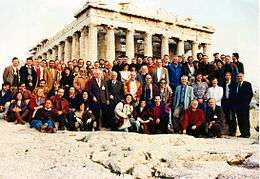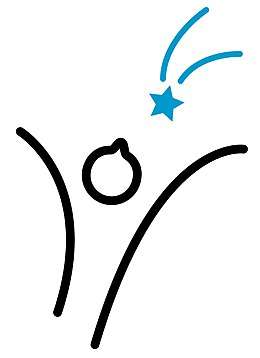European Association for Astronomy Education
The European Association for Astronomy Education or EAAE[1] is a non-profit European organization for the promotion of science education in general, and of astronomy in particular.[2]

.gif) EAAE Logo | |
| Formation | 1995 |
|---|---|
| Type | Astronomy Education Organization |
Membership | teachers from 26 European countries |
| Website | www.eaae-astronomy.org |
The Organization was founded on November 25, 1995, in Athens, as a result of the Declaration of the EU/ESO workshop on Teaching of Astronomy in Europe's Secondary Schools that was held at the European Southern Observatory (ESO) Headquarters in Garching in November 1994.[3]
Structure
The Professional association|Association gathers the General Assembly for strategic decisions, and an Executive Council as the operational management. There are also National Representatives with a role on promoting the EAAE and its activities in their countries.[4][5]
Working Groups
International activities are promoted through the activity of three Working Groups.[7]
- Working Group 1 "Collaborative Projects" intends to promote collaborative work between teachers and students of different countries by creating specific science project activities for schools.[8]
- Working Group 2 "Catch a Star" promotes school research projects about astronomical objects through a contest.[9][10] The previous contests have been organized as a joint venture with the European Southern Observatory (ESO).
- Working Group 3 "Summer Schools" promotes teacher training about Astronomy Education. It provides an opportunity for teachers to learn about simple educational materials for their classes.[11]
Partnerships
The EAAE has had a long term collaboration with the European Southern Observatory (ESO) in many projects, including "Astronomy On-Line"[12] or "Catch a Star" [13] and has also collaborated with the European Space Agency (ESA) and with the European Organization for Nuclear Research (CERN) on the organization of Physics on Stage and Science on Stage.[14] Like most major organizations, since 2009 the EAAE has grown in social networks and has now mirrors of the "EAAE News" [15] on Facebook,[16] Twitter [17] and Portal to the Universe.[18] The EAAE has also collaborations with The European Planetarium Network (EuroPlaNet) and with the Euro-Asian Association of Teachers of Astronomy (EAATA).
See also
References
- European Association for Astronomy Education, EAAE
- Reichen, M. (2006). The European Association for Astronomy Education (Abstract), JAAVSO Volume 35, p.255 (PDF)
- Declaration of the EU/ESO workshop 1994
- European Association for Astronomy Education Homepage
- EAAE National Representatives
- "Catch a Star 2015 Contest Winners Announced". Retrieved 8 July 2015.
- General Assembly, Madrid, 2009
- Working Group 1-Collaborative Projects
- Working Group 2-Catch a Star
- "Catch a Star Project"
- Working Group 3-Teacher Summer Schools
- West, R.(2006). The "Astronomy On-Line" Project (Abstract), JAAVSO Volume 35, p.256 (PDF)
- "Catch a Star Project"
- Science on Stage Project Partners Page
- EAAE News blog
- EAAE News on Facebook
- EAAE News on Twitter
- EAAE News on Portal to the Universe
